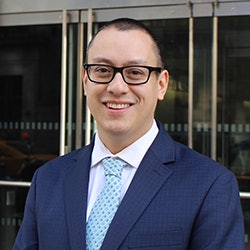As public safety and community well-being come under scrutiny, the scholarship of Dr. Eric L. Piza, associate professor at John Jay College of Criminal Justice in New York, provides insight into policing and alternative approaches to public safety as well as evidence-based solutions.
Prior to entering academia, Piza spent five years working at the Newark Police Department in New Jersey as a geographic information systems specialist, a crime analysis and program evaluation position.
 Dr. Eric L. Piza
Dr. Eric L. Piza“He’s a really unique individual because he brings both his academic perspective and he’s got the practical hands-on policing,” says Dr. Anthony Carpi, associate provost and dean of research at John Jay. “It’s really informed some of the efforts at the college to think about how we should be training police officers … to be most effective and understanding in the different situations they may encounter in the field.”
Rather than coming up with a theory and then gathering data to support that theory, Carpi says Piza maintains an objective perspective and looks at what the data shows when examining communities with higher rates of violence or crime. Piza says an unbiased look at the data may yield an unexpected conclusion.
“At the Newark Police Department, I saw the benefit that research and evaluation can have for public safety purposes, but I also saw how difficult it was … for police departments to carve out time to do the science,” Piza says. “That’s really what sparked my research interest in looking at research questions that not only have academic importance, but also have practical value to the everyday challenges of enhancing public safety.”
Crime reduction is only one part of a complicated equation, says Piza. There must be sensitivity to community perspectives and walking the fine line between maximizing public safety while making sure policing is bias-free. Over the next two to three years, Piza will review police body camera footage and systematically view, code and analyze it.
“What we’ve been doing with [the Newark Police Department] is looking at body camera footage of use of force events for the purpose of understanding how police use of force unfolds in the field,” says Piza. “We want to understand better exactly why a given situation resulted in force while another one didn’t.
“The police department this year has also come around to the fact that body cameras can be a powerful tool for ensuring that police act without bias,” he continues. “We’re in the very early stages of discussing an extension of this project that would look a little bit more closely about auditing police decision making.”
Carpi says Piza emphasizes an active learning environment that integrates technology both in and out of the classroom. Piza finds today’s students are more comfortable expressing themselves using technology. In his classes, before the final term paper is due, students have the option to record a five- to 10-minute video of themselves giving an overview of the paper, which allows students to communicate their plans and identify areas where they may need some guidance.
He also utilizes Twitter, and each of Piza’s classes has a specialized hashtag. Students are sometimes required to identify real-world events that relate to the readings and put it on Twitter with the hashtag prior to class. During class, they give a short presentation describing how the news story relates to the readings, which encourages students to think critically about the subject matter.
In another project, Piza and Dr. Kevin T. Wolff are working with the city of Paterson, New Jersey, on analyses and interventions around the opioid epidemic. Thus far, they’ve worked on problem analysis to understand the neighborhoods most at risk and the current gaps in services and substance abuse treatment.
“They’re going to spend the next couple of years designing and implementing a range of strategies meant to specifically curtail the opioid problem in the city and we’re going to work with them to evaluate those efforts,” he says.
Dr. Eric L. Piza
Title: Associate Professor, Department of Criminal Justice, John Jay College of Criminal Justice, City University of New York
Education: Associate degree, psychology, B.A., M.A. and Ph.D., criminal justice, Rutgers University
Age: 38
Career mentors: Dr. Joel Caplan, Dr. Leslie Kennedy and Dr. Todd Clear, Rutgers University; Dr. Anthony Braga and Dr. Rod Brunson, previously at Rutgers, now at Northeastern University; and the late Dr. George Kelling at Rutgers.
Words of wisdom/advice for new faculty members: “Junior faculty members have so many competing demands: research, teaching and service. It can be very easy to take on a lot of responsibilities. You have to be careful and aware of your time.”
This article originally appeared in the January 21, 2021 edition of Diverse and is one in a series of profiles about this year’s 2021 Emerging Scholars. Read about all of them here.



















